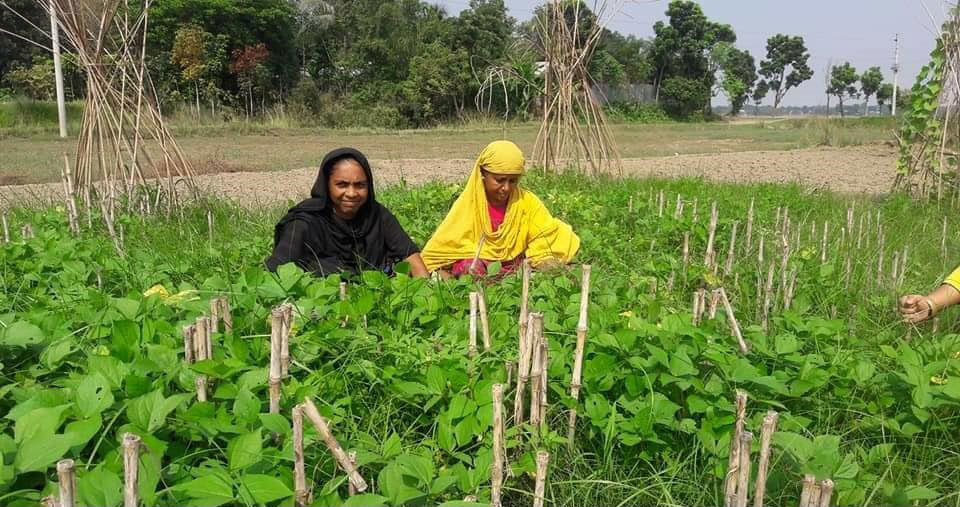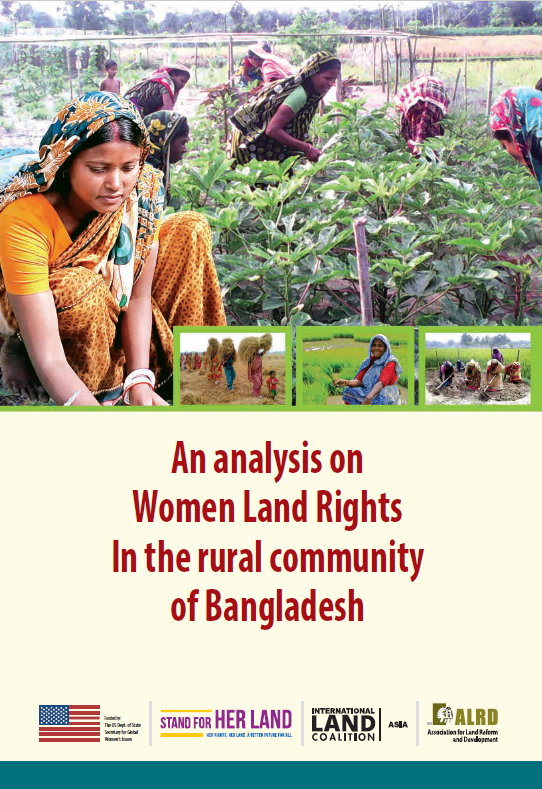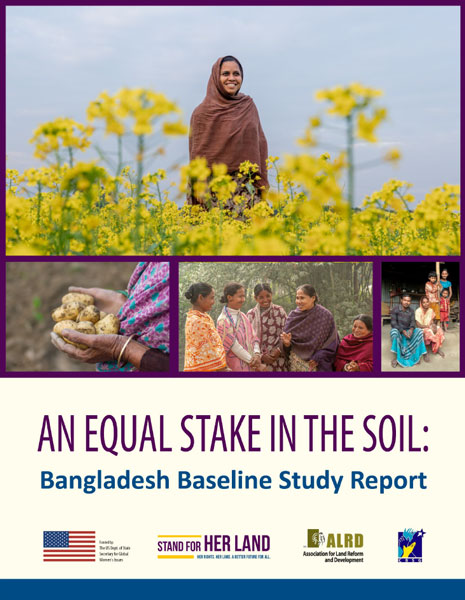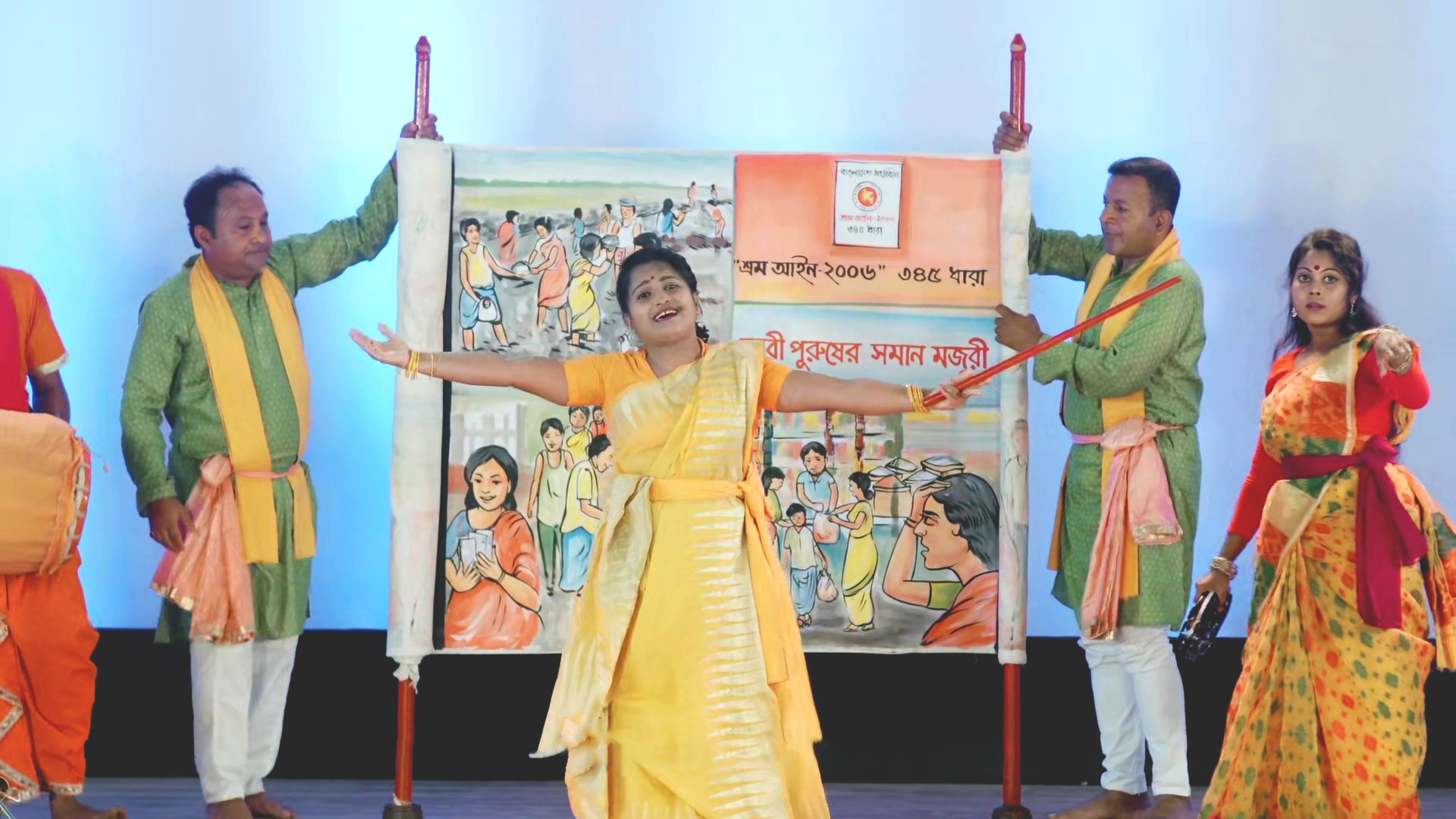Country Coalition
Bangladesh

Women farmers working in a vegetable field. Photo credit: ALRD
GOAL
To create the enabling environment needed to recognize and promote women’s land rights for women’s economic empowerment.
MEMBER ORGANIZATIONS
FOUNDED
November 2021
OVERVIEW
1 in 5 Bangladeshi women fear they may lose their right to use the land they live on within the next 5 years.
While the Constitution calls for equality regarding property rights, inheritance laws in Bangladesh are religion-based and remain inequitable. This denies most women the ability to gain land rights, because most land in Bangladesh is acquired through inheritance. In cases where women do inherit land, they rarely receive their legal share — and what they are legally entitled to is still inequitable relative to men.
Stand for Her Land Bangladesh works directly with women-driven CSOs to shift the social norms regarding who should own and control land. Alongside partner CSOs, Coalition members also engage with local government institutions to build political will for stronger women’s land rights governance and encourage gender equity in public land distribution efforts.
Currently, fewer than 13 percent of women in Bangladesh’s rural landowning households have documented rights to land – a statistic S4HL is putting in the past.
READ: Bangladesh Country Strategy and Action Plan
READ: Overview of S4HL Bangladesh Coalition's work to date (November 2023)
KEY FOCUS AREAS
1
2
3
4
ACTIVITIES: A SNAPSHOT
Public land distribution
S4HL Bangladesh will support local CSOs to engage with local zonal settlement offices responsible for distributing public (Khas) land, to ensure these offices are actively reaching out to women and including women’s names on land titles.
Social norms and behavior change pilots
In communities selected by the S4HL Bangladesh Coalition members, local CSOs will pilot innovative, contextually-specific legal literacy activities and social norms and behavior change strategies to address social discrimination around women’s land rights. Local CSOs are exploring the potential for these pilots through community dialogues, and will share the learnings, tools, and methods with the S4HL Bangladesh Coalition networks upon completion.
Public awareness campaigns
To increase social recognition at large of the legitimacy and importance of women’s land rights, S4HL Bangladesh will design and launch media campaigns for social media, TV and radio, SMS/WhatsApp messaging, and national print journalism.
Member Organizations
Coordinator: Association for Land Reform and Development (ALRD)
Association for Realisation of Basic Needs (ARBAN)
Badabon Sangho
Beneficiary’s Friendship Forum (BFF)
Community Development Association (CDA)
Kapaeeng Foundation
Nagorik Uddyog (NU)
Speed Trust
Sundarban Adibasi Munda Sangastha (SAMS)
Featured Resources
Women's land rights are practically denied in Bangladesh; here women have little access to agricultural and non-agricultural land. This is the reality at least for most of the women who are poor and marginalized. There are both demand-side and supply-side bottlenecks playing a role in the non-realization of women's land rights. Demand-side hindrances include, among others, illiteracy and ignorance of women and their disinclination to claim their land rights due to social norms and expectations. Supply side constraints include poor policies, poor implementation, and a lack of institutional will and governance mechanisms to protect and promote women's land rights.
In this context, this assessment is commissioned for identification of legal and policy gaps regarding women's access to land rights, social norms, and behavioral practices among different communities.
The goal of this mixed methods study is to support the development of pilot interventions, conducted under the US Department of State-funded "Equal Stake in the Soil" project in Bangladesh, to address social norms and behavior change and legal literacy related to women's land rights (WLR) and to provide a baseline description of existing socials norms, behaviors, and levels of legal literacy prior to implementing the interventions.
In Bangladesh, the work is headed by the Association for Land and Rural Development (ALRD). The overall goal of the project is to strengthen and sustain the capacity of networked, women-driven NGOs and CSOs in Bangladesh to create the enabling environment needed to recognize and promote WLR for women's economic empowerment.
A "pot song" is a form of folk storytelling in Bangladesh. The Stand for Her Land (S4HL) Bangladesh coalition is adopting this traditional format to help raise awareness about women's land rights around the country. S4HL Bangladesh lead Association for Land Reform and Development (ALRD) produced this pot song film, which it screens at both community events and at national convenings.
The performers are from the Rupantar pot song troupe, based in Dhaka, Bangladesh.



